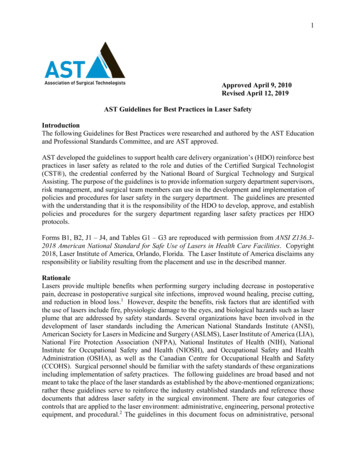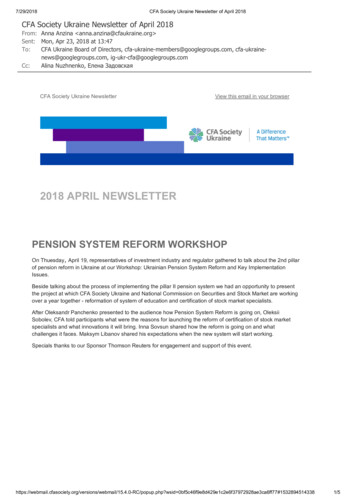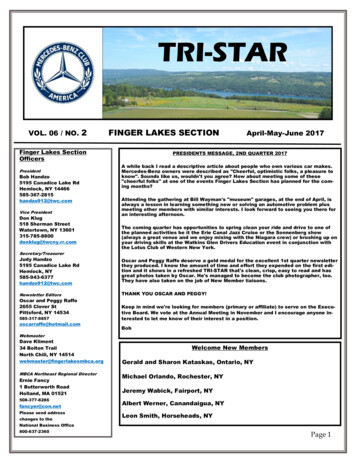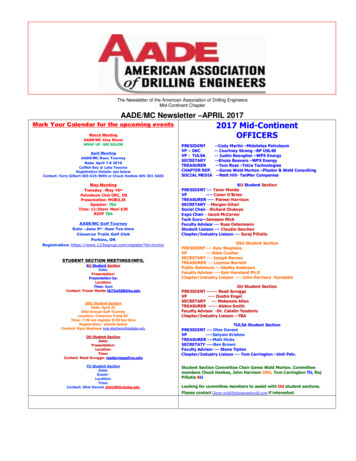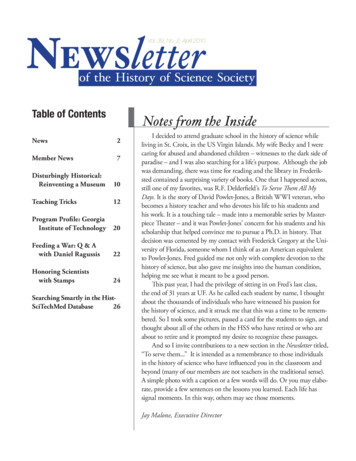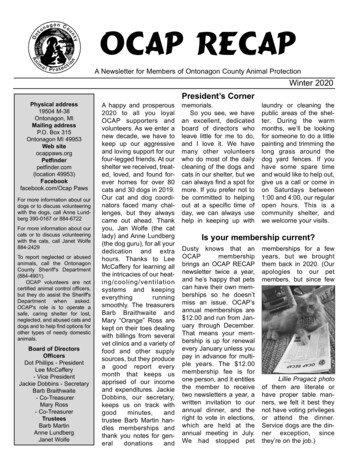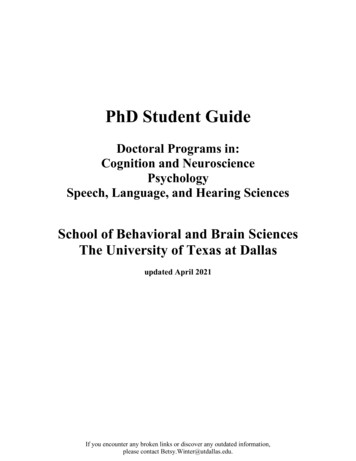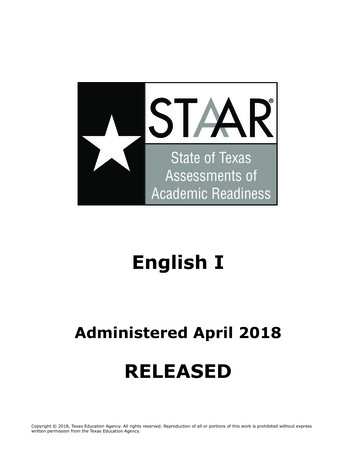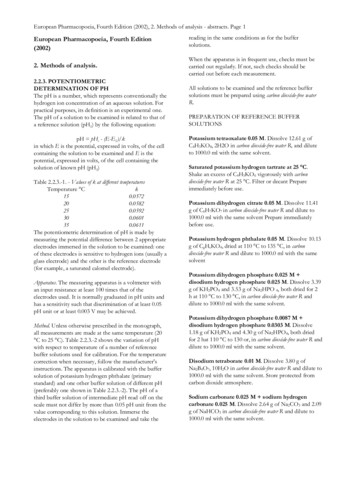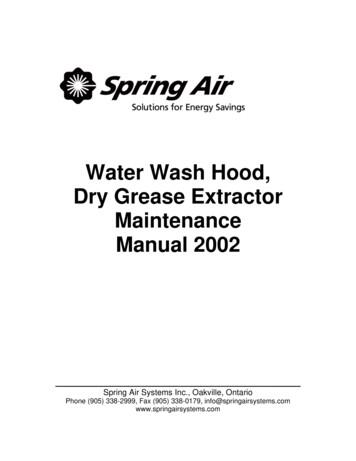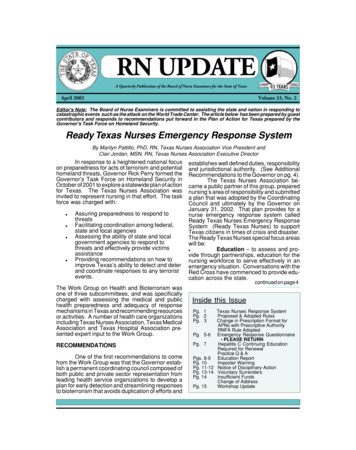
Transcription
RN UPDATEA Quarterly Publication of the Board of Nurse Examiners for the State of TexasApril 2002Volume 33, No. 2Editor's Note: The Board of Nurse Examiners is committed to assisting the state and nation in responding tocatastrophic events such as the attack on the World Trade Center. The article below has been prepared by guestcontributors and responds to recommendations put forward in the Plan of Action for Texas prepared by theGovernor's Task Force on Homeland Security.Ready Texas Nurses Emergency Response SystemBy Marilyn Pattillo, PhD, RN, Texas Nurses Association Vice President andClair Jordan, MSN, RN, Texas Nurses Association Executive DirectorIn response to a heightened national focuson preparedness for acts of terrorism and potentialhomeland threats, Governor Rick Perry formed theGovernor’s Task Force on Homeland Security inOctober of 2001 to explore a statewide plan of actionfor Texas. The Texas Nurses Association wasinvited to represent nursing in that effort. The taskforce was charged with: Assuring preparedness to respond tothreatsFacilitating coordination among federal,state and local agenciesAssessing the ability of state and localgovernment agencies to respond tothreats and effectively provide victimsassistanceProviding recommendations on how toimprove Texas’s ability to detect and deterand coordinate responses to any terroristevents.The Work Group on Health and Bioterrorism wasone of three subcommittees, and was specificallycharged with assessing the medical and publichealth preparedness and adequacy of responsemechanisms in Texas and recommending resourcesor activities. A number of health care organizationsincluding Texas Nurses Association, Texas MedicalAssociation and Texas Hospital Association presented expert input to the Work Group.RECOMMENDATIONSOne of the first recommendations to comefrom the Work Group was that the Governor establish a permanent coordinating council composed ofboth public and private sector representation fromleading health service organizations to develop aplan for early detection and streamlining responsesto bioterrorism that avoids duplication of efforts andBoard of Nurses.7911establishes well defined duties, responsibilityand jurisdictional authority. (See AdditionalRecommendations to the Governor on pg. 4).The Texas Nurses Association became a public partner of this group, preparednursing’s area of responsibility and submitteda plan that was adopted by the CoordinatingCouncil and ultimately by the Governor onJanuary 31, 2002. That plan provides for anurse emergency response system calledReady Texas Nurses Emergency ResponseSystem (Ready Texas Nurses) to supportTexas citizens in times of crisis and disaster.The Ready Texas Nurses special focus areaswill be:Education – to assess and provide through partnerships, education for thenursing workforce to serve effectively in anemergency situation. Conversations with theRed Cross have commenced to provide education across the state. Insufficien continued on page 4Inside this IssuePg. 1Pg. 2Pg. 3Texas Nurses Response SystemProposed & Adopted RulesChange in Prescription Format forAPNs with Prescriptive AuthorityRNFA Rule AdoptedPg. 5-6 Emergency Response Questionnaire- PLEASE RETURNPg. 7Hepatitis C Continuing EducationRequired for RenewalPractice Q & APgs. 8-9Education ReportPg. 10Imposter WarningPg. 11-12 Notice of Disciplinary ActionPg. 13-14 Voluntary SurrendersPg. 14Insufficient FundsChange of AddressPg. 15Workshop Update4/9/02, 4:59 PM
RN UpdateApril 2002Volume 33, No. 2Proposed and Adopted RulesAt the January 2002 meeting of the Board of Nurse Examiners,the Board took the following actions:***adopted amendments to 22 TAC §§216.3, relating to Continuing Education Requirements for Hepatitis C. New Rule§216.3 amendments became effective March 13, 2002.See article on pg. 7 for more information.proposed the repeal of current 22 TAC §§217.17, relatingto Minimum Procedural Standards During Peer Review.§217.17 moved to new 22 TAC §§217.19. Submittedto Texas Register for public comments on February 21,2002. Earliest possible date of adoption: April 7, 2002.proposed new 22 TAC §§217.19, relating to Incident BasedPeer Review, and new 22 TAC §§217.20, relating to SafeHarbor Peer Review for RNs. Submitted to TexasRegister for public comments on February 21, 2002.Earliest possible date of adoption: April 7, 2002.BOARD MEMBERSOfficersLinda Rounds, PhD, RNPresident, representingAdvanced PracticeNursing Education,GalvestonThalia Munoz, MS, RNVice-President, representingNursing Practice,Rio Grande CityMembersDeborah Bell, CLU, ChFCConsumer Member, AbileneVirginia Campbell, BSN, RN, CNORrepresenting Nursing Practice,Mesquite*adopted 22 TAC §§217.18, relating to Registered NurseFirst Assistants. New Rule §217.18 became effectiveMarch 13, 2002.*adopted amendments to 22 TAC §§221.4, relating toAdvanced Practice Nurses and the requirement that theyobtain national certification in the appropriate advanced roleand specialty area. New Rule §221.4 amendmentsbecame effective March 14, 2002.*The Board of Nurse ExaminersFor the State of Texasadopted 22 TAC §§222.4, relating to Minimum Standardsfor Carrying Out or Signing Prescriptions. Changes referAPNs to appropriate sections of the Texas Pharmacy Actrelating to generic substitution. New Rule 222.4 is effectiveMarch 6, 2002.Lawrence Canfield, MS Ed., CRNArepresenting Nursing Practice,TempleMarcelo Laijas, Jr.Consumer Member, FloresvilleSue McGee, MSN, RNrepresenting ADN Programs,AmarilloElizabeth Poster, PhD, RNrepresenting BSN Programs,ArlingtonPhyllis Caves Rawley, CPCConsumer Member, El PasoThe Board also:**adopted new 22 TAC §§211 concerning General Provisions of the Board. A review of the rule was conducted andrevisions were made for clarification and simplification asrequired by rule review statutes. New Rule 211 is effectiveMarch 31, 2002.adopted emergency amendment to 22 TAC § 223.1, concerning Fees. The fees are necessary to raise revenue andto cover statutorily requisite online fees for RN and APNrenewals. The adopted fees include the present feesposted on the BNE website and a 2 increase each for RNand APN online renewals. Emergency rule effective March12, 2002 and open to discussion at the April 2002 BNEBoard meeting.For more information on rules mentioned above, refer to theTexas Register via the Office of the Secretary of State for theState of Texas located at http://lamb.sos.state.tx.us/texreg/index.html. Comments should be addressed to: Board ofNurse Examiners, P.O. Box 430, Austin, Texas 78767-0430.Executive DirectorKatherine Thomas, MN, RNRN Update is the officialpublication of the Board of NurseExaminers for the State of TexasPublished four times a year, January,April, July and October. Subscriptionprice for residents within the continental U.S. is 5.00, plus tax. Subscriptionprice outside of U.S. is 10.00 plus tax.Published by:TEXAS STATE BOARD OFNURSEEXAMINERSVOLUME XXXIII - No. 2Publication Office:333 Guadalupe, Suite 3-460Austin, Texas 78701-3942Phone: 512/305-7400Fax No.: 512/305-74012Board of Nurses.79124/9/02, 4:59 PM
RN UpdateApril 2002Volume 33, No. 2Change in Prescription Format for Advanced Practice Nurseswith Limited Prescriptive Authorityby Jolene Zych, MS, RNC, WHCNPAdvanced practice nurses with limited prescriptive authority should be aware that there will be achange in the Texas State Board of Pharmacy’s (TSBP’s) rule relating to generic substitution. SB768, passed by the 77th Texas Legislature, required that the TSBP adopt rules relating to the mannerin which practitioners indicate dispensing instructions regarding generic substitution on writtenprescriptions. The current rule (22 TAC §309) requires two signature lines with appropriatedispensing instructions under each line. Beginning June 1, 2002, the two signature line format willbe eliminated. The new rule will require a practitioner to indicate “brand necessary” or “brandmedically necessary” in the practitioner’s own handwriting in order to prohibit generic substitution ona written prescription. Other changes were made concerning prescription format, and dispensingdirectives issued for verbal and electronic prescription drug orders. It is strongly recommended thatadvanced practice nurses with limited prescriptive authority review the new requirements outlinedin Chapter 309 of the TSBP’s Rules. Currently, the new rule is available on the Texas Register’sweb site at http://lamb.sos.state.tx.us/texreg/index.html. The rule appeared in the March 8, 2002issue under the section on “Adopted Rules.”RNFA Rule AdoptedAt the January 2002 meeting, the Board voted to adopt an amendment to Rule 217 by adding Section217.18, relating to registered nurse first assistants (RNFAs). HB 803, passed in the 77th LegislativeSession, amends the Nursing Practice Act by adding Section 301.1525. The section defines a“nurse first assistant” as a registered nurse who is certified in perioperative nursing by anorganization recognized by the Board and has completed a nurse first assistant program approvedby an organization recognized by the Board. The new section grants the Board authority to developrules relating to RNFAs. The new rule only applies to RNs who are functioning in the first assistantrole. It does not apply to certified surgical technologists or certified first assistants.Section 217.18 establishes a regulatory definition of registered nurse first assistant consistent withSection 301.1525. As such, it defines “nurse first assistant” as a registered nurse who is certifiedin perioperative nursing by an organization recognized by the Board and has completed a nurse firstassistant program approved by an organization recognized by the Board. The language in theadopted rule is exactly as it appears in Section 301.1525 of the Nursing Practice Act. All RNFAs musthold national certification as a perioperative nurse (CNOR) from the Certification Board PerioperativeNursing (CBPN). Currently, the CBPN is the only organization directly involved in reviewing RNFAeducation programs. CBPN reviews programs that prepare RNs for the first assisting role andincludes programs that meet established criteria on its list of acceptable programs for individualswho desire to sit for the CRNFA certification exam. CBPN has written program acceptance criteriaand requires programs to demonstrate compliance through a written application process for initialacceptance. They have also adopted a process for verifying ongoing compliance with acceptancecriteria. Therefore, the Board adopted a policy that those RNFAs who have completed a programthat is included in CBPN’s list of acceptable programs have met the requirement for completion ofa “nurse first assistant program approved by an organization recognized by the Board.” New Section217.18 also recognizes that current certification by the Certification Board Perioperative Nursing asa registered nurse first assistant (CRNFA) may be accepted in lieu of completing a first assistantprogram approved by an organization recognized by the Board. Additionally, the new rule createsa registry for those RNFAs who meet the criteria, reiterates the minimum standards required for allregistered nurses practicing in the first assistant role, and recognizes AORN standards for firstassisting.RNs who elect to first assist must meet the requirements established by Section 301.1525 of theNursing Practice Act and Rule 217.18. RNs who do not meet these requirements may continue tofunction in either the scrub or circulating roles, but they may not function as first assistants. The newrule may be reviewed on the Board’s web site at www.bne.state.tx.us.Insufficien continued on page 93Board of Nurses.79134/9/02, 4:59 PM
RN UpdateApril 2002Volume 33, No. 2Ready Texas Nurses Emergency Response System - continued from page 1Communication – to maintain a communication system with the nursing professionduring emergency situations utilizing web based, online, e-mail, fax and mail. The communicationswill maintain clinical best practice updates; present information on early detection or symptoms ofnuclear, biological or chemical terrorism and reporting directions; target messages directed towardnurse leadership in inpatient hospital settings, outpatient hospital care, school health, clinics, homehealth and long-term care facilities; and recruit and process volunteers. Management of Nursing Workforce – Ready Texas Nurses will provide managementof the nursing workforce during emergency situations in the following ways: 1. Texas Nurses Association will maintain a database of nurses who have registered withthe Ready Texas Nurses data bank, had disaster training and had credentials cleared,and will maintain current contact information. TNA can activate this system in responseto the needs of the Texas Department of Health (TDH).2. Toll-free telephone numbers will be used to accept and filter spontaneous nursevolunteers from both within Texas and out-of-state, and assign them as needed and asdeemed appropriate by TDH.3. The Ready Texas Nurses can alert key portions of the entire nurse workforce as certainskills are identified and required, i.e., the need for nurses who are knowledgeable andskilled in immunization.Nurses who want to become part of the Ready Texas Nurses Emergency Response System canlog on to www.texasnurses.org, after April 1, 2002, click the Ready Texas Nurses logo and updatetheir profile. They can also complete the questionnaire on the following page, detach the form fromthe RN Update and mail it to the address on the back of the form.SITUATION ASSUMPTIONS Ready Texas Nurses will be activated by appropriate Texas Department of Health contacts tothe TNA Executive Director, Clair Jordan, MSN, RN.Ready Texas Nurses will be activated when the local supply of nurses is insufficient to meet thedepth and breadth of the emergency.Nurses employed or on staff at an acute care hospital will first fulfill the responsibilities of theirinstitution disaster plan before volunteering.Nurses employed in a local, county or state public health system will first fulfill the responsibilitiesof their entity before volunteering.Additional Recommendations to the GovernorOther recommendations to the Governor by the Work Group on Health and Bioterrorismin response to his charges to the Task Force on Homeland Security include:Requesting all health licensing organizations and agencies to require licensees toprovidebusiness fax numbers and e-mail addresses if available when completing licenseand registration forms.Requesting all health licensing organizations and agencies require licensees toattend at least one hour each year of continuing education on respondingto the consequences of an incident of terrorism and reporting of medical events.Directing TDH to work in conjunction with the Department of Public Safety Division ofEmergency Management and the Centers for Disease Control to review and updateplans for quarantine, hospitalization and evacuation procedures in the event of a terroristattack with due regard to civil liberties.Directing TDH to develop a statewide plan that could include public and private healthresources to administer mass vaccinations and chemoprophylaxises should theybe required. Editor's NoteAdditional information on the Task Force and related activities by the Governor's Office may be located at http://www.governor.state.tx.us/. The Homeland Security Task Force Report may be read in it's entirety at ndex.htm4Board of Nurses.79144/9/02, 4:59 PM
Yes!I want to be a part of the Ready Texas Nurses Emergency Response SystemIn cooperation with the Board of Nurse Examiners an initial databank has been established with basic information. Nurseswho have Internet access are requested to visit www.texasnurses.org and update their Ready Texas Nurses profile to ensureexpediency and accuracy – however, if you do not have Internet access please complete the following information and returnit to the address on the back of the page.CORE INFORMATION – be sure to printName: RN License #:Designation/Credentials:Home Address: City: St: Zip:Employer:Work Address: City: St: Zip:Home Phone: /Work Phone: /E-Mail Address:Alternate E-Mail Address: Home Fax: /Cell Phone: /Business Fax: /Pager: /Daytime Contact Method (rank)*:1. Home Phone 2. Work Phone 3. Cell Phone 4. Pager 5. E-mail6. Alternate E-mail*Rank by preference, with 1 being the 1st contact preference.Night/Weekend Contact Method (rank)*:1. Home Phone 2.Work Phone 3. Cell Phone 4. Pager 5. E-mail6. Alternate E-mailLanguages Spoken Other Than English (circle):1. Arabic 2. Chinese 3. Japanese 4. Korean 5. Spanish 6. Vietnamese7. American Sign Language8. Other:Emergency Training (circle):1.2.3.4.5.6.Advanced Cardiac Life Support (ACLS)Advanced Trauma Life Support (ATLS)Pediatric Advanced Life support (PALS)Neonatal Advanced Life Support (NALS)Pre-Hospital Trauma Life Support (PHTLS)Cardio Pulmonary Resuscitation (CPR)7.8.9.10.11.Emergency Medical Technician (EMT)ParamedicRed Cross Disaster TrainingTrauma Nurse Core Curriculum (TNCC)Nuclear, Biological, Chemical (NBC)Military Service (circle):1. I have served in the active Military2. I have served in the Military Reserve3. I have served in the National Guard4. Does not apply If you circle one, two or three above, then:Which branch of the service were you attached to:Active Dates:Reserve Dates: Guard Dates:Areas of Clinical Expertise (circle):1. Adolescent6. Comm. Disease2. Allergy/Immunology 7. Dermatology3. Burns8. Emergency4. Cardiac9. Geriatrics5. Chem. Dependency 10. Immunization11.12.13.14.15.Infection ControlIntensive Pediatrics21.22.23.24.25.Psych./CounselingPublic HealthRadiologyRehabilitationTraumaEmployment Setting (circle #):1. Hospital 2. School of Nursing 3. School/College Health 4. Long Term Care 5. Home Health6. Physician/Dentist Office 7. Community/Freestanding ClinicI can respond in the following area(s) (circle):1. Local Area 2. Statewide 3. Surrounding States 4. Nationwide 5. WorldwideI can be available within (circle):1. Less than 24 hours 2. 24-48 hours 3. 2-5 days 4. 1 week 5. 1-2 weeks 6. 30 daysI can be away from home/work (circle):1. Less than 24 hours 2. 24-28 hours 3. 2-5 days 4. 1 week 5. 1-2 weeks 6. 30 days7. IndefinitelyBoard of Nurses.79154/9/02, 4:59 PM
FOLD HEREPLACESTAMPHEREReady Texas Nurses7600 Burnet Road, Suite 440,Austin, Texas 78757-1292FOLD HEREBoard of Nurses.79164/9/02, 4:59 PM
RN UpdateApril 2002Volume 33, No. 2Hepatitis C Continuing Education Required for License RenewalBy Carol Marshall, MSN, RNSenate Bill 338, Section 2, passed by the 77th Legislative Session, in part amended Subchapter G,Chapter 301, Occupations Code by adding Section 301.304 to the Nursing Practice Act (NPA)related to Hepatitis C continuing education for nurses. House Bill 2650 is the companion billimplementing the same requirement. Subsequent to this legislative action, Rule §216.3 was revisedto add this one-time Hepatitis C continuing education requirement [§216.3(4)].As discussed in the January 2002 RN Update, RNs in the state of Texas who have licensurerenewal dates that fall between 6/1/2002 and 6/1/2004 must acquire at least 2 contact hours ofcontinuing education in Hepatitis C when renewing the license between 6/1/2002-6/1/2004. Forboth RN’s and RN’s with advanced practice (APN) recognition from the Board, this requirementmay be met through completion of either Type I or Type II approved continuing education activities.The two hour requirement counts as part of the mi
Nursing (CBPN). Currently, the CBPN is the only organization directly involved in reviewing RNFA education programs. CBPN reviews programs that prepare RNs for the first assisting role and includes programs that meet established criteria on its list of acceptable programs for indivi
